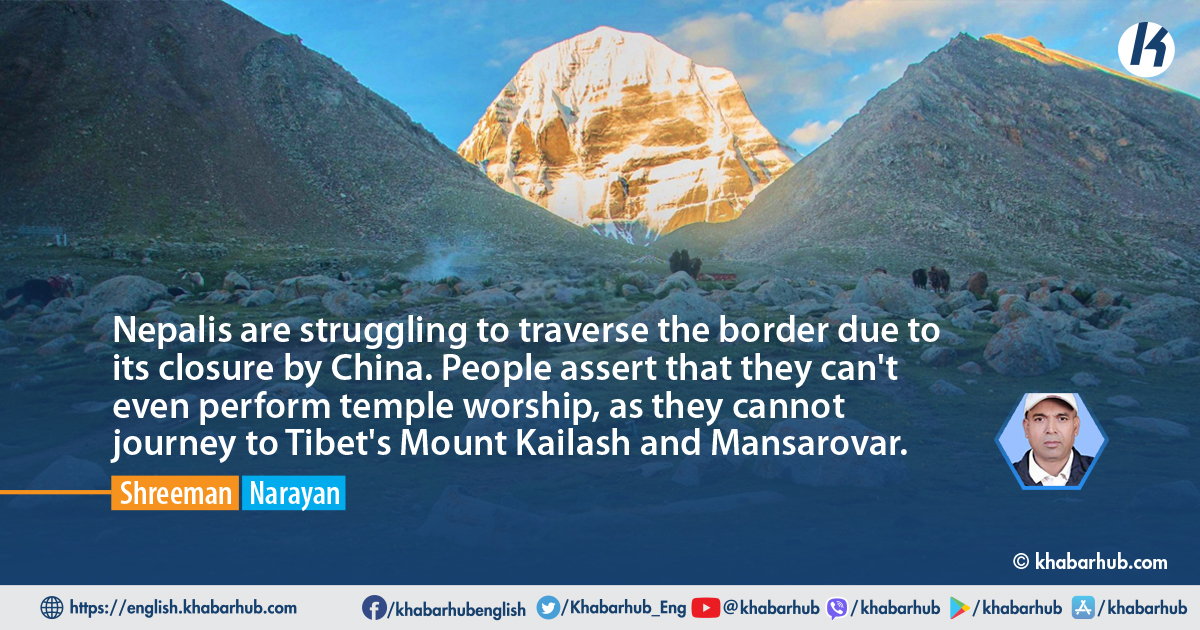Temple worship has been brought to a standstill due to China’s sealing of its borders. The aftermath of the 2015 devastating earthquake prompted China, Nepal’s northern neighbor, to close the Tatopani border crossing.
This led to a shift in import and export operations to the Rasuwagadhi Kerung crossing. Subsequently, Nepal faced nearly a three-year border closure due to the Covid-19 pandemic, resulting in significant economic losses.
This situation has plunged Nepal into a substantial trade deficit in its bilateral trade. While China has partially resumed border operations lately, some crossings remain shut, profoundly affecting the lives of people living in border regions.
The closure of the route to Taklakot via Urai passing (bhanjyang) in Bajhang, western Nepal, has posed challenges in obtaining water from the revered Mansarovar, impacting worship at the Shiva temple and other sacred sites. For adherents of Sanatan Dharma, the importance of Kailash Mansarovar is unparalleled.
The ritual of bathing in Mansarovar holds deep significance for many. Fetching water from the holy river Ganga (Gangajal) is uncomplicated.
Traditionally, people from Bajhang would journey to Tibet by foot to get water from Mansarovar. This path, considered sacred, was traversed by locals, including Dhamis and priests, who held a deep faith in the practice.
However, accessing water from Mansarovar has become difficult due to the border closure. This has disrupted an annual worship tradition in bordering areas of Nepal, where water from Mansarovar in Tibet is brought for rituals.
Bhuntu Dhami from Sunikot Ward No. 1 in Bajhang District oversees Ramani Mastadevata, a local temple. He has been in Kathmandu for a month, working to revive dormant worship practices.
The closure of the Taklakot crossing since November 2076 and the impact of the COVID-19 pandemic heightened efforts to reopen the border.
Local residents are grappling with the border’s closure by China, which prevents them from performing temple worship due to the inability to travel to Mansarovar.
Recently, residents from the region visited Kathmandu, meeting Foreign Minister NP Saud to petition for the border’s reopening.
Temples like Ramji Bista in Bajhang rely on water from Mansarovar for worship. The lack of access to this water has halted rituals.
The scarcity of water has also delayed the appointment of new priests in certain temples, where the annual puja begins only with Mansarovar water. The four-year-long border closure has significantly impacted the lives of border region residents.
While China is viewed as a reliable ally, the spiritual significance of Mansarovar transcends geopolitical considerations.
Traditionally, people from Bajhang would journey to Tibet by foot to get water from Mansarovar. This path, considered sacred, was traversed by locals, including Dhamis and priests, who held a deep faith in the practice.
However, entering Tibet has become complex due to changes in Chinese regulations, making it difficult for Bajhang residents to reach Mansarovar via Hilsa in Humla.
Recent adjustments have disrupted the longstanding treaty allowing residents of bordering districts to enter both countries within 30 kilometers based on citizenship.
Bajhang residents are advocating for entry through Taklakot, their traditional route, asserting that crossing through Humla to Mansarovar is perilous. They are urging diplomatic measures to facilitate traffic through this route.
Representatives from Bajhang, along with Foreign Minister NP Saud and Nepali Congress President Sher Bahadur Deuba, have expressed concerns.
The closure of the Taklapur crossing has not only severed Bajhang’s religious and cultural ties but also a trade relationship between Bhot and Aulsang that has persisted for centuries.
Foreign Minister Saud has assured Bajhang representatives that the government is working to reopen closed border crossings, including this one.
The matter is expected to be discussed during Prime Minister Pushpa Kamal Dahal “Prachanda’s” upcoming visit to China.
While China is viewed as a reliable ally, the spiritual significance of Mansarovar transcends geopolitical considerations.
The call to reopen the gates for this sacred pilgrimage should be heeded, and if China is willing, a solution can certainly be found.









Comment